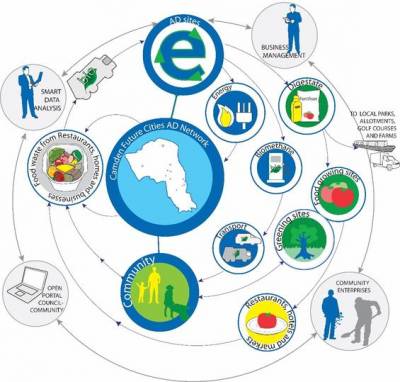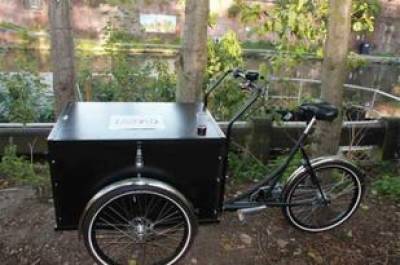Closed-loop urban organic resource management
Report by Dr Aiduan Borrion, May 2015, for the UCL Circular Economy Lab CircEL
Local Energy Adventure Partnership (LEAP) is a cross sector partnership that combines expertise in engineering, research, project management and education to develop sustainable, locally managed closed-loop solutions for organic waste that can help build community resilience and wellbeing (figure 1).
In the circular economy, waste becomes a valuable resource, just as in nature. By replicating natural recycling processes through anaerobic digestion (AD), we can create organic closed-loop cycles in the urban environment, where levels of organic waste, demand for food and employment opportunities are typically high. AD transforms organic waste into renewable fuel and fertiliser. Small digesters can serve SMEs, social housing estates, institutions etc. to manage waste produced on-site. Managing waste locally reduces waste miles and diverts organic waste from landfill.
Biogas provides clean, renewable fuel for heating, cooking, electricity generation and vehicle refueling, while the liquid fertiliser, rich in bioavailable nutrients, is excellent for food growing, hydroponics, algae cultivation and turf strengthening.
For a small scale 2m3 anaerobic digestor, 20 kg food waste are processed daily which produce 3.6 m3 biogas and 19.8kg digestate. Biogas is then converted to electricity (3.2 kWh per day) and heat (19.4 kWh per day). Digestate can be used as organic fertilizer. The project's carbon footprint is minimised by using cargo bikes (figure 2) for local food waste collections from local businesses within a 1 mile radius.
Over the last 3 years, LEAP has designed and installed demonstration plants in Central London, monitoring and evaluating both economic and technical performance. In the course of this work, it has become clear that tackling one aspect of a closed-loop cycle isn't enough. All parts of the cycle need to be in place for it to work. To this end the following challenges in closing the loop have been identified:
1. The issue of surplus digestate is a challenge at both large and small scales. Digestate is a high quality organic liquid fertiliser, albeit variable depending on feedstock composition. However, due to the surplus liquid digestate produced, digestate needs to be processed in order to be applied in large scale agriculture to meet regulation requirement and used as feedstock for nutrient and chemical recovery. In the micro AD context, to be cost effective, the ideal scenario would involve one digestate processing plant serving a network of local digesters.
2. Intensive urban agriculture models and community food growing enterprises are in development round the world. More demonstrations are needed however, to work through the logistics of utilising digestate in such systems.
3. Few affordable small-scale gas-upgrading units exist on the market with current models ranging between £60-180k. LEAP is working on units between £10-30k to enable smaller plants to benefit from being able to upgrade biogas to methane for vehicle refueling and in standard gas appliances.
A team of UCL researchers, led by Dr Aiduan Borrion, is working with LEAP to develop solutions to tackle the digestate challenges. The project conducts a feasibility study aimed at maximising large-scale urban agriculture outputs through the application of anaerobic digestate. The project will contribute significantly to creating an 'agroecological urban metabolism', by integrating waste management technology and community elements. The work builds on existing demonstrations, incorporating recent UCL work on urban sustainability and earlier modelling of food-growing on low-income housing estates. It will contribute to the food security and sustainable use of resources debate by establishing preliminary research into the integration of waste management and urban agriculture to create a closed-loop cycle, and exploring new enterprises opportunities in food production, which link closely with local communities.
More information about this project can be found in the web link below:
https://www.bartlett.ucl.ac.uk/sustainable/latest/activities/symposium_series/symposium-2015/research-grants/2015-cat-grant-4

Figure 1. Closed-loop recycling across the London Borough of Camden (Future Cities Feasibility Report 2012)

Figure 2 Cargo bike
 Close
Close


